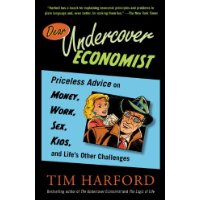| 商家名称 |
信用等级 |
购买信息 |
订购本书 |
|
|
 |
Dear Undercover Economist: Priceless Advice on Money, Work, Sex, Kids, and Life' |
 |
|
 |
Dear Undercover Economist: Priceless Advice on Money, Work, Sex, Kids, and Life' |
 |

基本信息·出版社:Random House Trade Paperbacks
·页码:240 页
·出版日期:2009年08月
·ISBN:0812980107
·International Standard Book Number:0812980107
·条形码:9780812980103
·EAN:9780812980103
·装帧:平装
·正文语种:英语
内容简介 Throughout history, great philosophers have been answering profound questions about life. But do they know why your socks keep disappearing from the dryer, or how to choose the quickest line at the supermarket? Probably not, but Tim Harford does. . . .
In Dear Undercover Economist, the first collection of his wildly popular Financial Times
columns, Tim Harford offers witty, charming, and at times caustic answers to our most pressing concerns–all through the lens of economics. Does money buy happiness? Is “the one” really out there? Can cities be greener than farms? Can you really “dress for success”? When’s the best time to settle down? Harford provides brilliant, hilarious, unexpected, and wise answers to these and other questions. Arranged by topic, easy to read, and hard to put down,
Dear Undercover Economist lends an outrageous, compassionate, and indispensable perspective on anything that may irk or ail you–a book well worth the investment.
作者简介 Tim Harford is the author of the bestseller
The Undercover Economist and
The Logic of Life and a member of the editorial board of the
Financial Times, where he also writes the “Dear Economist” column. He is a regular contributor to
Slate, Forbes, and NPR’s
Marketplace. He was the host of the BBC TV series
Trust Me, I’m an Economist and now presents the BBC series
More or Less. Harford has been an economist at the World Bank and an economics tutor at Oxford University. He lives in London with his wife and two daughters.
媒体推荐 “Harford writes like a dream–and is also one of the leading economic thinkers of his generation.”—David Bodanis, author of
Electric Universe
文摘 Chapter One
Speed dating with a money-back guaranteeIt is not for nothing that sex, dating, and relationships have traditionally formed the staple of the agony column. Wise words on these subjects are not easy to find. Not many people want to ask their parents for tips about losing their virginity. It is no less embarrassing to seek the opinions of colleagues as one contemplates an extramarital affair. We know that envious friends may not always give us impartial advice when we wonder whether we have, at last, found “the one.” What could be more welcome in such cases, then, than the cool counsel of economic rationality?
Economists, it is true, do not generally enjoy a reputation as lotharios—unsurprisingly, when the economist’s response to the delicate question of faking orgasms is to reach for the analytical framework of a two-player signaling game. But economists do not dismiss love. On the contrary, we are unorthodox experts in the romantic arts. Economists understand decision-making in the face of uncertainty. We understand the dangerous blandishments of cheap talk and the value of binding commitments.
Above all, economists understand the concept of non-zero-sum games, interactions in which both sides can expect to benefit from the bargain. When it comes to love, you could even say that we economists are optimists.
September 6, 2003
Dear Economist,
My boyfriend and I have been seeing each other for a while, and last month he moved in with me. It seems sensible for us to put his apartment on the market, but he’s suggesting that we wait awhile in case things don’t work out. What would you advise?
—V.H., via email
Dear V.H.,
Modern living has made it so much more difficult to judge where you stand.
Mothers used to teach their daughters not to believe suitors’ promises that they would still love them in the morning. Then, commitmen
……




